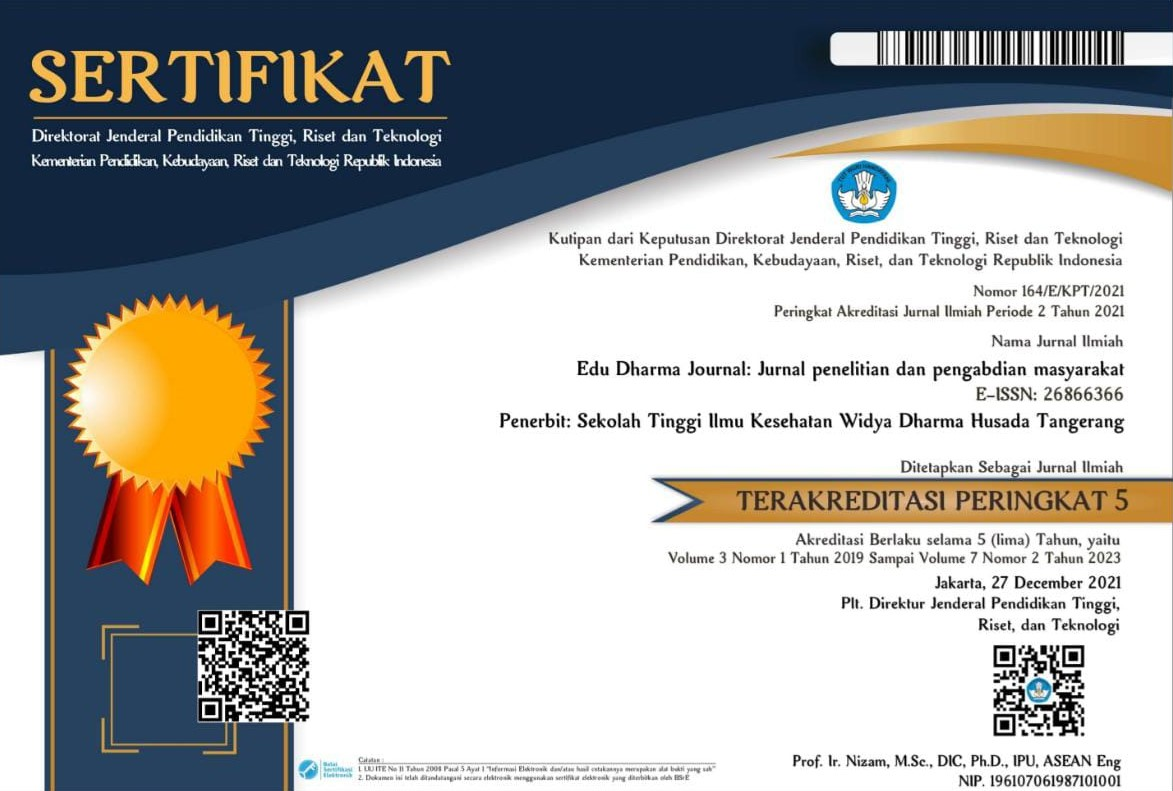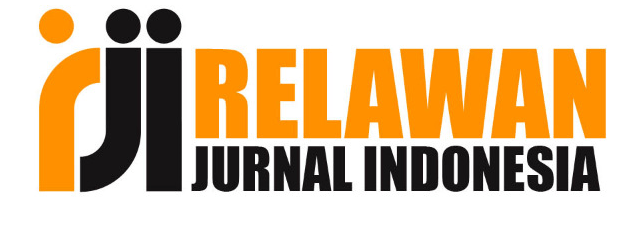HUBUNGAN SELF-EFFICACY DENGAN DISTRESS DIABETES PADA PASIEN DIABETES MELITUS DI POLIKLINIK PENYAKIT DALAM RSU KOTA TANGERANG SELATAN
Abstract
Diabetes mellitus is one of the non-communicable diseases that many people suffer from today. Diabetes mellitus patients are required to change their lifestyle and undergo good self-care to reduce the risk of complications. Negative psychological conditions that appear resulting in concerns related to health development and diabetes self-care management are called diabetic distress. This condition can affect diabetes management and have an impact on the patient's quality of life. This is influenced by several factors and one of them is self-efficacy which is needed to maintain the behavior needed to manage effective self-care. The purpose, of this study was to determine the relationship of self-efficacy with diabetes distress in patients with diabetes mellitus at the Polyclinic of Internal Diseases of the RSU Kota Tangerang Selatan. The method, of research used in this study is a quantitative method with a cross sectional approach. The number of samples in this study were 110 respondents, using non probability sampling technique using purposive sampling method. This research instrument used the DDS-17 and DSES questionnaires. The results, showed that patient self-efficacy was in the low category (50.9%) and patient diabetes distress was in the severe category (50.0%). Based on the results of the chi square test, the p value of 0.000
ABSTRAK
Diabetes melitus merupakan salah satu penyakit tidak menular yang banyak diderita oleh masyarakat saat ini. Pasien diabetes melitus dituntut untuk merubah pola hidup dan menjalani perawatan mandiri dengan baik untuk mengurangi risiko terjadinya komplikasi. Kondisi psikologis negatif yang muncul mengakibatkan kekhawatiran terkait perkembangan kesehatan dan manajemen perawatan diri diabetes disebut dengan distress diabetes. Kondisi ini dapat mempengaruhi manajemen diabetes dan memberikan dampak pada kualitas hidup pasien. Hal ini dipengaruhi oleh beberapa faktor dan salah satunya adalah self-efficacy yang dibutuhkan untuk mempertahankan perilaku yang diperlukan untuk mengelola perawatan diri yang efektif. Tujuan penelitian ini untuk mengetahui hubungan self-efficacy dengan distress diabetes pada pasien diabetes melitus di Poliklinik Penyakit Dalam RSU Kota Tangerang Selatan. Metode penelitian yang digunakan dalam penelitian ini adalah metode kuantitatif dengan pendekatan cross sectional. Jumlah sampel dalam penelitian ini sebanyak 110 responden, menggunakan teknik non probability sampling dengan menggunakan metode purposive sampling. Instrumen penelitian ini menggunakan kuesioner DDS-17 dan DSES. Hasil penelitian menunjukkan bahwa self-efficacy pasien berada pada kategori rendah (50,9%) dan distress diabetes pasien berada pada kategori berat (50,0%). Berdasarkan hasil uji chi square, diperoleh nilai p value 0,000 < 0,05 sehingga hipotesis diterima (Ha). Maka dapat disimpulkan terdapat hubungan antara self-efficacy dengan distress diabetes pada pasien diabetes melitus di Poliklinik Penyakit Dalam RSU Kota Tangerang Selatan. Saran dari hasil penelitian ini diharapkan dapat menjadi pedoman bagi pelayanan kesehatan untuk menkaji tingkat distress serta memberikan motivasi pada pasien diabetes melitus untuk mengurangi kejadian distress diabetes.
Keywords
Full Text:
PDFReferences
Abraham, C., & Sheeran, P. (2014). The health belief model. Cambridge Handbook of Psychology, Health, and Medicine, Second Edition, January, 97 102. https://doi.org/10.1017/CBO9780511543 579.022
Abdurrasyid, Wiarsih, W., & Sukihananto. (2018). Distress Diabetic Merupakan Faktor yang Paling Berhubungan Dengan Kualitas Hidup Diabetisi Tipe 2. IJOHNS, 3(2), 96–100.
Adiputra, A. B., & Arifuddin, F. (2021). Karakteristik Dan Faktor Yang Berhubungan Dengan Distress Diabetes Penderita DM di Wilayah Kerja Puskesmas Balangnipa Sinjai. Jurnal Kesehatan Panrita Husada, 6(1), 49–59.
Adli, F. K. (2021). Diabetes Melitus Gestasional : Diagnosis dan Faktor Risiko. Jurnal Medika Hutama, 03(01), 1545–1551.
Adugnew, M., Fetene, D., Assefa, T., Kedir, S., Asmamaw, K., Feleke, Z., Gomora, D., & Mamo, H. (2024). Diabetes Related Distress And Its Associated Factors Among People With Type 2 Diabetes In Southeast Ethiopia: A Cross- Sectional Study. BMJ Open, 14(1), e077693.
Ajijah, J. H., & Selvi, E. (2021). Pengaruh Kompetensi Dan Komunikasi Terhadap Kinerja Perangkat Desa. Jurnal Manajemen, 13(2), 232–236.
Anita, D. C. (2020). Distress Pada Pasien Diabetes Mellitus Dan Faktor Biologis Yang Mempengaruhinya. Yogyakarta: Universitas ’Aisyiyah Yogyakarta.
Arif, M. A., Syed, F., Javed, M. U., Arif, S. A., Hyder, G.-E.-L., & Rehman, A. (2018). The ADRIFT Study - Assessing Diabetes Distress And Its Associated Factors In The Pakistani Population. J Pak Med Assoc, 68(11), 1590–1596.
Arifin, B., Perwitasari, D. A., Thobari, J. A., Cao, Q., Krabbe, P. F. M., & Postma, M. J. (2017). Translation, Revision, and Validation of the Diabetes Distress Scale for Indonesian Type 2 Diabetic Outpatients with Various Types of Complications. Value In Health Regional, 12C, 63–73.
Arsad, S. F. M., Dungga, E. F., & Kidamu, S. C. (2023). Hubungan Health Locus of Control Dengan Kepatuhan Menjalani Diet Pada Pasien Diabetes Mellitus. Jambura Nurisng Journal, 5(1), 101–115.
Dewi, R. (2023). Evidence-Based Practice Pada Diabetes Mellitus.
Yogyakarta: Deepublish.
Djaelan, S., Lumadi, S. A., & Prastiwi, E. D. (2022). Self Efficacy Berhubungan Dengan Kepatuhan Minum Obat Dan Pola Diet Pada Penderita Diabetes Mellitus Tipe 2. Profesional Health Journal, 3(2), 149–160.
Du, Y., Baumert, J., Paprott, R., Färber, F., Nübel, J., Hermanns, N., Heidemann, C., & Scheidt-Nave, C. (2023). Diabetes Related Distress And Associated Factors Among Adults With Diabetes In Germany: Results Of The Nationwide Study “Disease Knowledge And Information Needs – Diabetes Mellitus 2017.” Journal of Psychosomatic Research, 164.
Irawan, D., Ismonah, & Handayani, P. A. (2022). Hubungan Self Efficacy Dengan Self Care Management Penderita Diabetes Mellitus Tipe 2 Di Wilayah Binaan Puskesmas Karangayu. Jurnal Perawat Indonesia, 6(3), 1234–1248.
Irawati, P., & Firmansyah, A. (2020). Hubungan Dukungan Keluarga Dengan Kepatuhan Diet Pada Pasien Diabetes Militus Di Puskesmas Cipondoh Kota Tangerang. Jurnal JKFT: Universitas Muhamadiyah Tangerang, 5(2), 62–67.
DOI: https://doi.org/10.52031/edj.v9i2.1171
Refbacks
- There are currently no refbacks.
Copyright (c) 2025 Wisnu Handoko, M. Didin Wahyudin, Suryadi

This work is licensed under a Creative Commons Attribution-NonCommercial-ShareAlike 4.0 International License.
Sekolah Tinggi Ilmu Kesehatan Widya Dharma Husada Tangerang
Pajajaran Street Number 1 Pamulang,
South Tangerang City, Banten Province, Indonesia, 15417
Telephone: 021-74716128 / Handphone : 089529263441
Edu Dharma Journal: Jurnal Penelitian dan Pengabdian Masyarakat by the Sekolah Tinggi Ilmu Kesehatan Widya Dharma Husada Tangerang is distributed under the Attribution-ShareAlike 4.0 International (CC BY-SA 4.0).
Based on the work at http://openjournal.wdh.ac.id/.






